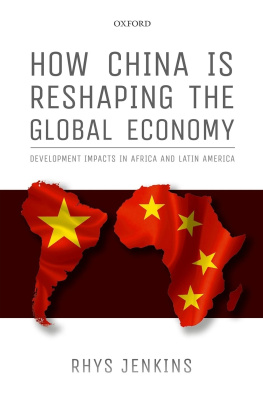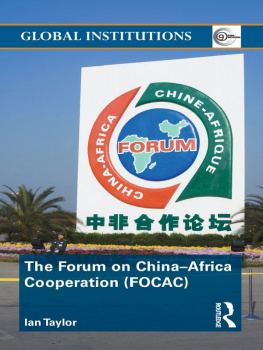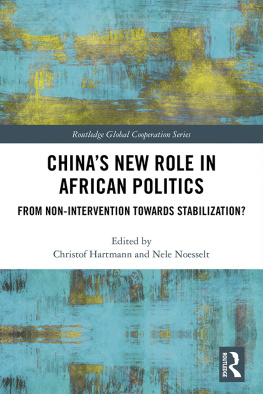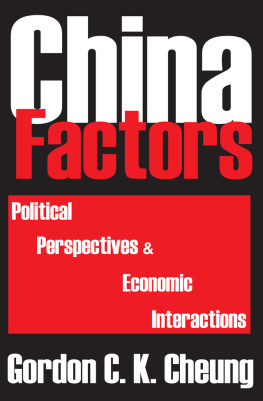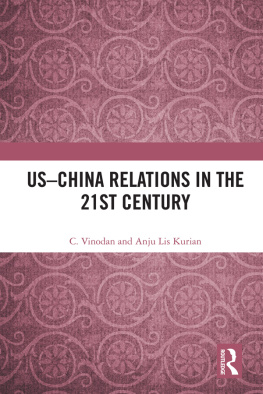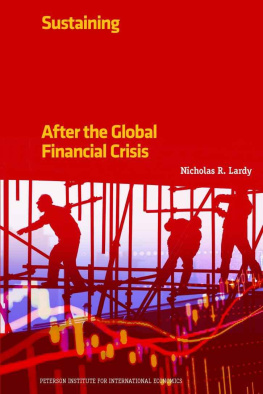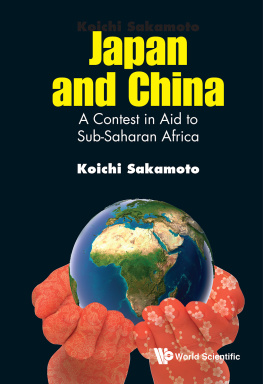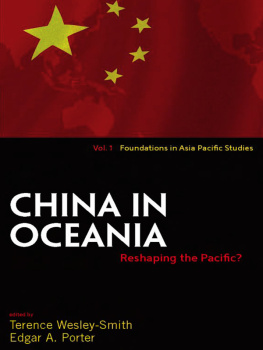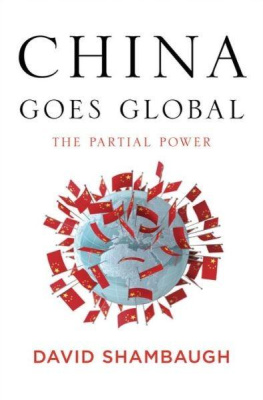How China is Reshaping the Global Economy

Great Clarendon Street, Oxford, OX2 6DP, United Kingdom
Oxford University Press is a department of the University of Oxford. It furthers the Universitys objective of excellence in research, scholarship, and education by publishing worldwide. Oxford is a registered trade mark of Oxford University Press in the UK and in certain other countries
Rhys Jenkins 2019
The moral rights of the author have been asserted
First Edition published in 2019
Impression: 1
All rights reserved. No part of this publication may be reproduced, stored in a retrieval system, or transmitted, in any form or by any means, without the prior permission in writing of Oxford University Press, or as expressly permitted by law, by licence or under terms agreed with the appropriate reprographics rights organization. Enquiries concerning reproduction outside the scope of the above should be sent to the Rights Department, Oxford University Press, at the address above
You must not circulate this work in any other form and you must impose this same condition on any acquirer
Published in the United States of America by Oxford University Press 198 Madison Avenue, New York, NY 10016, United States of America
British Library Cataloguing in Publication Data
Data available
Library of Congress Control Number: 2018949663
ISBN 9780198738510
ebook ISBN 9780192569240
Printed and bound by CPI Group (UK) Ltd, Croydon, CR0 4YY
Links to third party websites are provided by Oxford in good faith and for information only. Oxford disclaims any responsibility for the materials contained in any third party website referenced in this work.
To my grandchildren,
Tom, Mat, and Kit,
who will experience the consequences of Chinas
re-emergence as a global economic power.
Preface and Acknowledgements
I first became interested in the impact of Chinas economic growth on the Global South in 2004, when I was commissioned by the UK Department for International Development (DFID) to prepare a paper for a conference in Beijing at the launch of the Inter-American Development Banks study of the opportunities and challenges that the emergence of China presented for Latin America and the Caribbean (Devlin et. al., 2006). This was the first time that I had visited China, and it began a period when my research was mainly focussed on questions posed by the rise of China.
Much of my previous work had been about the impact of globalization, starting with studies of transnational corporations and trade liberalization in Latin America and then extending to work on the environmental and socioeconomic implications of globalization in Latin America, South Africa, Vietnam, and Malaysia.
By the mid-2000s, it was already becoming clear that the dramatic growth of China and its re-incorporation into the global economy was a key feature of globalization in the twenty-first century. The accession of China to the World Trade Organization in 2001 sparked a number of studies looking at the likely impacts that this would have in both the North and the South.
My own interest developed through further studies for DFID on the impacts of China on Asia, Africa, and Latin America, carried out with my colleague Chris Edwards. I was also involved in a network of scholars who studied the impacts of the Asian Drivers (China and India) on the Global South and published special issues of the IDS Bulletin and World Development on this theme (Kaplinsky, ed., 2006: Kaplinsky and Messner, eds., 2008).
Some of my subsequent research on the impact of China on Latin America, on Brazil, and on South Africa was funded by the UK Economic and Social Research Council (ESRC), and this allowed me to go into greater depth on the impacts of China on specific countries. I worked with a number of colleagues on these projects and I am particularly grateful for their contributions. They include Jonathan Barton, Enrique Dussel-Peters, Andrs Lopez, Alexandre de Freitas Barbosa, and Lawrence Edwards. I was also fortunate to receive a Leverhulme Research Fellowship that enabled me to start work on this book.
As I delved deeper into the impacts of China on Latin America and the Caribbean (LAC) and Sub-Saharan Africa (SSA), I became aware that I needed to obtain a better understanding of the drivers of Chinese growth and global projection. Thus, although the book was originally planned as a study of the impacts of China on the two regions, I realized that it needed to begin with developments in China. Although I do not claim to be an expert on Chinese economic development, I hope that Part of the book will provide the reader with sufficient background to make sense of the impacts on LAC and SSA.
I am very conscious that one limitation I faced in writing the book is that I do not read Chinese. This may have led to the underrepresentation of some points of view. I have tried wherever possible to refer to official Chinese documents that are available in English and to the work of Chinese academics that has been translated into or published in English. However, this probably does not do full justice to the range of Chinese views on LAC and SSA, and it may mean that Chinese perspectives that are more critical are not fully represented. On the other hand, I have drawn on a range of sources from both LAC and SSA to ensure coverage of views from within both regions.
I would like to thank colleagues who have read and commented on parts of this book for their invaluable feedback. They include Enrique Dussel-Peters, Chris Edwards, Raphie Kaplinsky, Bereket Kebede, Diego Snchez-Ancochea, and John Thoburn. Michael Abou-Sleiman provided research assistance in putting together the database and carrying out the econometric analysis that is reported in the book. Finally, Sally Suttons editing work on the manuscript helped put it into a coherent and presentable form. I acknowledge all their contributions, while accepting ultimate responsibility for the contents and any errors that remain.
ESRC grant numbers RES-165-25-005; RES-238-25-0006; and ES/1035125/1.
Contents
Agricultural Bank of China
Agricultural Development Bank (China)
African Growth Opportunities Act
Asian Infrastructure Investment Bank
Agreement on Textiles and Clothing
Bank of China
China-Africa Development Fund
China Africa Research Initiative
Chinese Banking Regulatory Commission
China Construction Bank
China Council for International Cooperation on Environment and Development
China Development Bank
China Gezhouba Group Company
China Investment Corporation
China Nonferrous Metal Mining Corporation
China National Offshore Oil Corporation
China National Petroleum Company
China National Cereals, Oils and Foodstuffs Corporation
China Railway Engineering Corporation
Corporate social responsibility
Development Assistance Committee
Department of Foreign Assistance
Democratic Progressive Party
Democratic Republic of Congo
Extractive industries Transparency Initiative
Eastern Industrial Zone
Ethiopian Peoples Revolutionary Democratic Front
Economic Trade and Development Zone
Export-Import Bank of China

